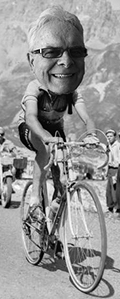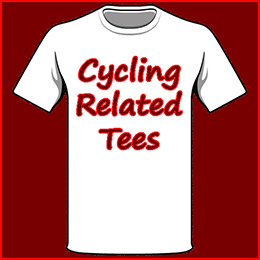Power, Torque and Traction
 Mon, October 19, 2020
Mon, October 19, 2020  Belgian Wout van Aert wearing the World Cyclocross Championship Jersey.
Belgian Wout van Aert wearing the World Cyclocross Championship Jersey.
A higher gear equals more traction under certain conditions. I learned this driving a manual (Stick-shift) transmission car in the late 1950s. The engine puts out torque, or twisting power, and torque is what moves the car forward. But only if the tires are gripping the road surface, if the wheels start to spin on ice, snow, or soft ground, then torque is reduced to zero, and the car goes nowhere.
The torque the engine produces is multiplied by the transmission, with the first gear (Lowest) increasing the torque the most. Therefore, first gear is engaged when starting out from a standstill as more torque is needed to move the weight of the vehicle. Once the car is rolling, less torque is required so the driver shifts up through the gears to eventually reach top gear, which puts out the least amount of torque, but transmits more revs, or speed.
If the car is stuck in mud or deep snow, the driver can sometimes get out by starting from a standstill in 3rd or 4th gear, thus reducing torque. He then pushes the clutch pedal down to disengage the clutch, revs the engine a little, and then allows the clutch to engage slightly so the clutch is slipping.
In normal circumstances, if the driver were to allow the clutch to fully engage, the engine would most likely stall because the load would be too great. But by slipping the clutch the driver is limiting the power going to the wheels. As the clutch slowly engages, torque is transmitted to the wheels gradually, just enough to move the car, but not applying too much torque so the wheels start to spin.
Now let’s fast forward from what I learned from driving a stick-shift in the 1950s, to what I learned riding cyclo-cross in the 1970s, and bear with me, there is a connection.
I was running my frame building business just outside Worcester in the West Midlands area of England. A good place to be in the bike business, as this area was a hotbed of British cycle racing, including cyclo-cross. From October to January there were events every weekend within easy driving distance.
Business slowed in the winter months, my commute to work on my bike, and a two-mile run on foot every evening was enough training, coupled with a cyclo-cross race each Sunday. I always reckoned a one-hour cyclo-cross race was the equivalent of 80 hard miles on the road. That is what my legs always felt like after a race.
There were all class of riders in these races. Professionals rode with the amateurs, and after a bunch start, the events soon strung out to a procession around a one mile or so course. I was in my early forties and still pretty fit, plus over time I gained a cyclo-cross skill set that allowed me to beat riders who were younger and faster on the road.
Some of the bigger events in the Birmingham area had enough prize money that some professional riders from Belgium and other mainland European countries would come across and enter. These guys were in a different class all together.
On a one mile course I would expect to be lapped at least two or three times during a race by the leading pros. I remember this Belgian rider went past me having caught me on my second lap, he then passed me every second lap. In other words, he was riding at twice my speed.
One time I was passed going up a steady incline through deep mud, I was in a low gear struggling to keep moving, and as this guy went by, I noticed he was on his smallest sprocket, probably 13 or 14 teeth. While my wheels were losing grip, slipping, and spinning, he appeared to be gliding across the top of the mud. Which of course was exactly what he was doing.
I remembered my old driving lesson that while my lower gear gave me more torque, it was of little use if I did not have traction. His higher gear equaled more traction, plus with his speed and momentum he was going so fast there was less time for him to sink in the mud.
 Wout van Aert (Jumbo-Visma) leads the GC group on the Grand Colombier (Image: Bettini Photo)I was recently reminded of this story watching Wout van Aert perform in the Tour de France. Setting an unbelievable pace on mountain stages, shelling some of the world’s best climbers out the back of the peloton. (Above,)
Wout van Aert (Jumbo-Visma) leads the GC group on the Grand Colombier (Image: Bettini Photo)I was recently reminded of this story watching Wout van Aert perform in the Tour de France. Setting an unbelievable pace on mountain stages, shelling some of the world’s best climbers out the back of the peloton. (Above,)
Not really considered a pure climber, certainly not built like one. The other thing is Van Aert won several stages in a sprint. Former World Cyclo-Cross Champion, he must have built up a tremendous core strength riding big gears through the mud in the manner I described earlier.
He certainly developed a big engine that produces a lot of torque.


































Man Exploiting Man
That is a joke. Not original, but never-the-less I found it funny and when I posted it on a social media site, I thought it was fairly safe in that it pokes fun at both ends of the political spectrum.
But someone fired back,
So, this person did not find this funny because it seems in their view under the socialism end of things no one exploits anyone.
I usually steer clear of politics for the simple reason I am a Brit living in the USA. I am not a citizen, I am a Green Card carrying, resident alien, with permanent residency. Under this arrangement I get all the same rights a US citizen gets.
They allow me to have a driver’s license and own and drive a car, to own a home and pay taxes like everyone else. The two things I cannot do are vote or do jury duty, I can manage quite well without those responsibilities, thank you very much.
But because I can’t vote I feel strongly that I should not voice political opinions and try to influence others who do vote.
However, it annoys me when left wing eco-nuts assume that the bicycle is exclusively theirs, and on the other hand, there are those who think because I ride a bicycle I must be a left wing eco-nut.
The commenter on my “joke” stated that they grew up under socialism with free health care, sounds a lot like growing up in the UK in the post war years. I grew up in that same period and here is my take on it just from what I observed, and experienced.
Before WWII there was a (Capitalist.) class system in the UK where a small percentage of the population had all the wealth. (Sound familiar.) Most of this wealth had been handed down from generation to generation for hundreds of years. The rest of the population were subservient to the wealthy class and relied on them for a job and a living. And in many cases rented a home from a wealthy landlord.
This system, with all its faults, had made Great Britain a world leader. This is pretty remarkable when you consider that Great Britain is less than the size of California. But over the years they built ships, sailed all over the world, taking over countries, taking commodities and raw materials at a cost of next to nothing.
This made the wealthy even wealthier. Britain manufactured a great deal of the goods that were shipped and sold all over the world. Up until 1919 the world currency was based on the British Pound, not the US Dollar. As a kid five shillings, which was a quarter of a Pound, was called a “Dollar.” Because there were once four US Dollars to the Pound. Today the Pound is worth $1.31.
Under the class system anyone born into the working classes found it difficult to reach the top levels of management in a large company. The CEOs and captains of industry were all from the wealthy upper classes. The British education system pre-WWII was geared so that working class kids would be separated at age ten years old.
The bright kids would get a higher education and become the accountants and middle management in industry. The rest of the kids got a basic sducation and had the self-esteem beaten out of them, physically and by verbal put down. This made them subservient laborers who would do a menial job without question or become cannon fodder for the armies to go off and conquer more lands.
Everything changed when WWII ended. The men who came home from the war had the attitude, “We laid our life on the line for our country, now we want a piece of the pie.” Clement Attlee the leader of the Socialist Labor Party was voted into power with a huge majority.
The Labor Government took over ownership by Nationalization of the steel industry, coal mining, and the railroads. They also created National Health Care, with free medicine and health care for everyone.
Of course, nothing is free, it was to be paid for by increased taxes. The government owned the hospitals and they paid the doctors and dentists a flat rate according to the number of patients they had.
There is a standing joke in the US about the British and their bad teeth, which is a direct result of NH dentists giving poor care. What incentive is there to give good care, and do extras like clean or straighten people’s teeth when you will not get paid more?
The other thing that happened was, there grew this huge government bureaucracy to manage the health care system and before long there were more bureaucrats than doctors or nurses.
When the government took over the steel, coal, and railroad industries the trade unions in those industries flourished. Trade unions are good when they fight for worker’s rights and make sure they are not exploited or under paid. But if your boss is the government, and the government is a socialist government, they are on your side.
In the mid-1970s there was a Conservative government in power who were not sympathetic the coal miners’ union when they asked for more money. The coal miners went on strike, and without coal, no electricity. There was a huge stockpile of coal, but the railway union refused to move it.
The country went on a three-day work week, and eventually the conservative government had to resign. A labor government was elected, the coal miners got their raise in pay and went back to work. By 1978 it seemed that everyone was on strike for more money.
Truck drivers were on strike and I couldn’t get deliveries of oxyacetylene to build my frames, I would go home and there would be no TV ‘cos the TV workers were on strike. When hospital workers who do laundry etc., went on strike and people died because doctors could not operate on them, it was the end of the line for me. It was then I decided to move to the United States.
I think many UK citizens felt as I did, because it was soon after that Maggie Thatcher and her conservative party got back in power. She de-nationalized much of the nationalized industries, and even privatized some of the hospitals. When the Labor Party got back in power in later years it was a much-watered down socialism, more in line with the US Democrats.
With no intention to influence anyone, I am just telling of my own experiences of living under both ends of the spectrum. Going to school in the 1940s in an education system evolved though years of extreme capitalism. Then see my country go to the other end of extreme socialism. Finally experiencing the frustrations of trying to run a business, in an atmosphere where not only the government, but my fellow man was against me.
Yes capitalists exploit their fellow man, that can often be blatantly obvious, but don’t tell me that socialists don’t exploit their fellow man, when they go on strike and let people die or suffer financially so they can get a pay increase.
And when unions become so powerful, they can bring down a democratically elected government, I call that exploiting your fellow man? A person who fails to see the humor in that little joke at the top of the page, has lost the ability to laugh at themselves and their belief system.